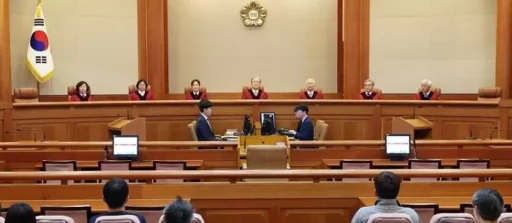Constitutional Court Determines 2-Year License Suspension for Repeat Drunk Driving is Constitutional
The Constitutional Court has made its first decision that the provision in the Road Traffic Act, which restricts re-acquisition of a driver's license for two years for individuals whose licenses are revoked due to drunk driving twice or more, does not violate the Constitution.
On the 27th, the court dismissed the constitutional petition filed by Mr. A and others, who claimed that "Article 93 Paragraph 1 of the Road Traffic Act is unconstitutional," with a unanimous opinion from all judges.

The current Article 82 of the Road Traffic Act stipulates that individuals who have committed drunk driving twice or more are not allowed to obtain a driver's license for a period of two years from the date of license revocation.
The Constitutional Court concluded that the legislative purpose of this provision is to protect the life, body, and property of the public from drunk driving, ensure road traffic safety, and achieve a preventive effect in curbing repetitive drunk driving behaviors.
The court emphasized the seriousness of drunk driving and its public interest value.
The court stated, "It is not easy for administrative agencies to individually assess the nature and degree of blame inherent in each violation when imposing administrative sanctions," indicating that setting a uniform disqualification period of two years is not excessive.
In particular, the court judged that even if it does not individually consider the temporal gap with past violations, the context of drunk driving, the nature of the violations, and blood alcohol concentration levels, it remains a reasonable restriction.

Moreover, the court highlighted, "Drunk driving is a serious crime that not only threatens the driver's own life but can also take the lives of innocent others and destroy the lives of their families, with significant social harm resulting from it," emphasizing that the public interest pursued by the disqualification clause is by no means smaller than the private interest it restricts.
Meanwhile, the Constitutional Court ruled that the claim regarding the provisions in the Road Traffic Act that revoke licenses for individuals who have committed drunk driving twice or more lacks the directness required for a fundamental rights infringement and decided to dismiss it.
This constitutional petition was brought by Mr. A and others, whose licenses were revoked due to repeated drunk driving, arguing that the relevant legal provisions infringe upon their freedom to work, general freedom of action, and equality rights.
A court official explained, "This decision is the first to determine the constitutionality of the provision of the Road Traffic Act that states individuals whose driver’s licenses are revoked due to drunk driving twice or more cannot obtain a driver's license for two years from the date of revocation."
Image Source: Reference Photos for Understanding the Article / gettyimagesbank, News1


